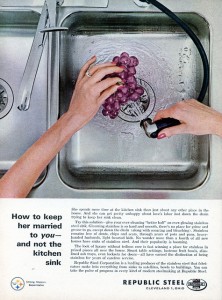“Hunger Games” Apology (sort of) from Jeffrey Wells
Posted on March 26, 2012 at 11:05 am
 Hollywood Elsewhere’s Jeffrey Wells has conceded my points about his appalling comments on “The Hunger Games,” perhaps more than he realizes.
Hollywood Elsewhere’s Jeffrey Wells has conceded my points about his appalling comments on “The Hunger Games,” perhaps more than he realizes.
To recap: I wrote about his offensive comments regarding the body of the movie’s lead actress, Jennifer Lawrence. He said she was “too big” for co-star Josh Hutcherson, revealing his assumptions that (1) for the purposes of aesthetics and credibility, the male lead has to be significantly bigger than the female lead, and (2) it is the obligation of the female star of a film, even if she is playing the most important role, to accommodate any perceived size inadequacy of her male co-star. Not content to insult Lawrence, actors and actresses in general, and the audience of fans, he also went on to insult female film critics, writing that they could not be trusted to evaluate this film. As I wrote earlier:
To add insult to injury — and some more insult, too — Wells advises his readers to beware of the reviews of “The Hunger Games” by female critics ”as they’re probably more susceptible to the lore of this young-female-adult-propelled franchise than most.” Um, “most?” Who would that be again?
He seems to have some Victorian notion that women get the vapors and cannot think straight. And that women somehow don’t count in deciding who makes up “most” ticket-buyers or members of the population.
I was pleased to see that Wells responded promptly, and if his reaction was a bit shrill, well, perhaps he is experiencing a bit of the vapors himself. Being wrong can do that. It is rather telling that until corrected by an alert commenter, he thought I was a man, referring to me as “Neil Minow.” I take it as a compliment to the validity of my post that he assumed it had to come from a bro and not a “susceptible” female.
But he made some important concessions and I want to give him credit for them. First, he agreed that if he was going to make a point about the mismatch of size of the two leads, his focus should have been on the co-star, not the lead. Second, although he did not mention that he amended the original post I quoted above (thank goodness another alert commenter called him on it), he did soften his indefensible comment about female critics, by revising it to say that “certain” female critics “may” be susceptible. “The use of ‘certain’ and ‘may’ make the difference between a blanket statement and a carefully phrased one,” he says. It is still an idiotic point, but by adding “certain” and “may” he shows that at some level he recognizes that. It would have been classier, though, if he had admitted that he backed down from what he himself calls a blanket statement. And “careful phrasing” would have dropped “female” entirely, I believe.
Wells ends by noting as though anyone had argued otherwise, that everyone brings some bias to a film. Where I come from, we prefer to call it a point of view, but certainly, there is no such thing as pure objectivity, which means that male critics are just as likely to be biased against a female action lead as female critics are to be biased in her favor. I am glad that “The Hunger Games” will be reviewed by fans of the book, people who have not read the book, people who consider it an anti-big government allegory, people who consider it an anti-fascism, pro-99% allegory, men, women, young critics and older critics. If there are film critics in District 12 and Capital City, I’d love to see what they have to say. I welcome all of these perspectives, even unreconstructed critics who think that the job of the female star is to conform to some notion of “appropriate” size and that the job of the female critics is to leave their gender at the door of the theater. But there is no excuse for making a sweeping generalization, refuted by the facts, that female critics and only female critics will over-praise the film. Fortunately, Wells’ admission that everyone is biased implicitly includes himself, so I am going to read that as an admission and apology and hope for better from him next time.



